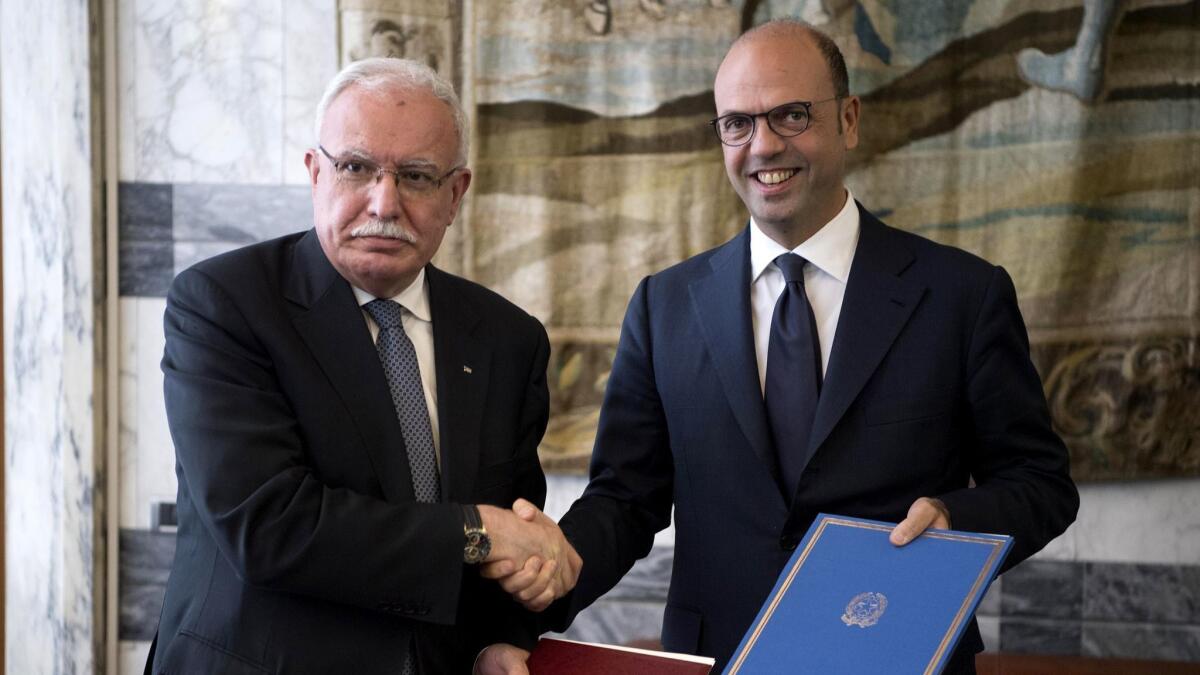Trump administration threatens to shut down Palestinian delegation in Washington

The Trump administration is threatening to shutter the Palestinian Authority’s representative office in Washington based on a provision of a U.S. law that has not been previously enforced.
The State Department recently informed the Palestinian Authority that if it does not reenter peace negotiations with Israel, its delegation to the United States could be closed within months, though it did not specify a timeline.
Secretary of State Rex Tillerson informed the Palestinians that the decision was made following statements by Palestinian President Mahmoud Abbas, who called on the International Criminal Court to investigate Israel for war crimes.
The State Department told the Associated Press that Abbas’ statements violate a law under which action taken by the Palestinians against Israel at the ICC could lead to the closure of their mission.
“This is a matter of U.S. law,” Israeli Prime Minister Benjamin Netanyahu said in a statement. “We respect the decision and look forward to continuing to work with the U.S. to advance peace and security in the region.”
Reached in Washington, Palestinian Ambassador to the United States Husam Zomlot said, “I have no comment. No comment at all.”
In September, Zomlot posted a video to his Twitter feed in which he said that Netanyahu’s attempts to close down the Palestinian delegation were “absurd” and that the delegation’s presence in Washington reflected the “will of the American people.”
Last September, the Israeli television channel KAN reported on a plan “hatched” by the Israeli government and Republican lawmakers in the U.S. to “punish the Palestinians for their recent diplomatic advances, including their successful bid to join Interpol, the world’s largest police organization, and their ongoing efforts to have Israeli leaders tried at the International Criminal Court.”
The latest warning shot does not bode well for the much-heralded but as-yet unveiled Trump peace plan, which is expected to be presented to Israel and the Palestinian Authority some time in December or January 2018.
“It is a puzzling position of the administration,” Abbas aide Nabil Abu Rudeineh said, underscoring the precariousness of the situation. “The Palestinian side has not received any document or idea from the United States for many months, despite the fact that many meetings had taken place with the administration.”
Speaking to Israeli media, Rudeineh said the threat leads Palestinians to conclude that “the United States is losing its position as a negotiator” and is “withdrawing from its role as a sponsor of the diplomatic process for peace as promised by President Trump.”
A State Department official told the Israeli newspaper Haaretz, “We are not cutting off relations with the PLO [Delegation], nor do we intend to stop working with the Palestinian Authority.”
The PLO Delegation, a precursor to the Palestinian Authority’s official mission, has had offices in Washington since 1994.
“Our relations with the PLO and PA extend well beyond contacts with the PLO office in Washington,” the State Department official said, according to Haaretz. “We remain focused on a comprehensive peace agreement between the Israelis and the Palestinians that will resolve core issues between the parties. This measure should in no way be seen as a signal that the U.S. is backing off those efforts. Nor should it be exploited by those who seek to act as spoilers to distract from the imperative of reaching a peace agreement.”
On Saturday, Palestinian Authority Foreign Minister Riyad Maliki said Washington’s threats amounted to “extortion,” and were part of a U.S. effort to sow uncertainty in the Palestinian leadership.
The White House and the Israeli government declined to comment.
The State Department told Haaretz that the latest warning was based on a technicality.
“In December 2015, Congress introduced a new condition concerning certain Palestinian actions related to the International Criminal Court. The most recent certification period ended in November. We were unable to make a new certification, and have notified the PLO accordingly. The Secretary concluded that the factual record, in particular certain statements made by Palestinian leaders about the ICC, did not permit him to make the factual certification required by the statute,” the department said, according to the newspaper.
Late in the day Palestinian sources told the AP that they would suspend all communication with the Trump administration if the U.S. closes the PLO office in Washington.
The State Department official clarified that “the same statute allows for a waiver of restrictions on the PLO in the U.S., including operation of its Washington office, if after 90 days the president determines the Palestinians have entered into direct, meaningful negotiations with Israel. We are hopeful that this closure will be short-lived.”
UPDATES:
1:40 p.m.: This article was updated with statements from Israeli Prime Minister Benjamin Netanyahu and Nabil Abu Rudeineh, an aide to Palestinian President Mahmoud Abbas.
This article was originally published at 10:50 a.m.
More to Read
Start your day right
Sign up for Essential California for news, features and recommendations from the L.A. Times and beyond in your inbox six days a week.
You may occasionally receive promotional content from the Los Angeles Times.






